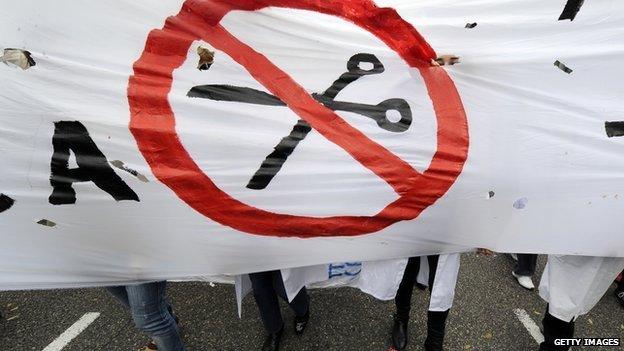Spanish apathy turns to anger at corruption 'epidemic'
- Published

Anti-austerity demonstrations have been widespread in Spain
There is fury in Spain after accusations that politicians have been lining their pockets while ordinary people are making painful sacrifices in the name of austerity.
There is a phrase in Spain I used to find admirable for its infinite pragmatism - "es lo que hay" - which means, "that's what there is".
It is said with a shrug of the shoulders and it works on nearly any occasion.
For example: "I ordered my squid without batter."
Waiter: "Well, that's what there is."
Or: "The politician you voted for has embezzled millions in public money and your town hall is bankrupt."
Response: "Ah well, that's what there is."
But such an epidemic of corruption is now coming to light in Spain that it seems to me the national shrug of apathy is finally falling out of fashion.
Taking its place is a look of abject disgust and the spat-out words "que verguenza". This means, "the shame of it".
For the last few months the corruption scandals have been so numerous that the television news began lumping them together in a swift round-up, rather than reporting on each one. They had to leave room for other news items - like the effects of austerity cuts and rocketing unemployment.
There is now a regular spot on Spaniards who used to have a job and a home, but do not have either any more. One featured a man who now lives in his car outside his former home.
Austerity came up at a dinner party I was at, as it does in most conversations here these days. Spain's anti-austerity protesters call themselves "los indignados" (the indignant).
"Why aren't you more indignant about corruption though?" I asked. A shrug. Someone poured more wine. Someone else said, "corruption? that's just what there is".
"We can't be indignant if the politicians steal," he explained, "because we're all at it. Take the man who came from the gas company to fix my boiler and offered to do it for me for half the price if I paid him personally in cash. Of course I said 'yes'."
It is hard to get a receipt in Spain - from the taxi drivers who tell you the ink has run out of the printer they are legally required to have, to the eminently respectable estate agent, who had a framed photo of the king in his office.
From behind his spectacles he told me if I wanted a receipt for his fee, he would have to charge me 250 euros (£215) in tax. So, in Spain you have to pay if you want to be indignant - and righteous.
'Slow' justice
Economists say that without the black economy there would be rioting on the streets. People are getting by. They are just not telling the taxman.
But suddenly the corruption scandals have become too big, and the justice system is seen as too slow when it comes to punishing those with power.

Former treasurer Luis Barcenas was questioned by prosecutors in Madrid
People are not saying, "ah, that's what there is" now.
"The shame of it", they are shrieking at, for example, the news that a mother who used a cash card she found on the street is going to prison for a year and a half. She used it to buy food and nappies.
People are angry that the king's son-in-law will only have some assets frozen if he does not pay his bail. His charitable organisation is accused of embezzling millions in public money that was supposed to be used to stage sporting events. He denies any wrongdoing.
There are also the rumbling cases of the flamenco star who refutes charges that she money-laundered for her husband while he was mayor of Marbella, and another ex-mayor who says no he did not take cash off the Russian mafia.
And then there is the big one. The recent revelations that the former treasurer of the governing Popular Party (PP) has been operating a 20 million euro (£17.25m) Swiss bank account. The PP has strenuously denied that this money, from no-one knows who, was handed over in cash-stuffed envelopes to the party's top brass, in exchange for who knows what?
And this time the politicians are being pressed to answer the questions. And they are not used to it. They stand before cameras blinking uncomfortably, like moles newly emerged into sunlight.
Thousands demonstrated outside the ruling party headquarters calling for the prime minister, Mariano Rajoy, to resign. They are not satisfied with the party announcement that it is going to investigate the allegations while simultaneously dismissing them as certainly untrue.
Mr Rajoy says the reputations of the majority of politicians, honest men and women dedicating their life to public work, are being unfairly tarnished by the alleged dishonesty of a few.
But then documents were published in the left-leaning El Pais newspaper which alleged that the prime minister was among the party members who had received one such bulging envelope from the Swiss bank account. It is a charge Mr Rajoy strenuously rejects.
And Mr Rajoy is right, Spaniards are cynical about all their politicians in all the parties. Although wrongdoing has not been proved Spaniards are angry, they are not shrugging anymore.
The other day a TV news crew was on the street asking people what should be done.
One middle-aged, mild-looking woman, replied "you know the French Revolution, where they cut off their heads? Well something like that might do the trick".
How to listen to From Our Own Correspondent, external:
BBC Radio 4: Saturdays at 11:30 and some Thursdays at 11:00.
Listen online or download the podcast.
BBC World Service: Short editions Monday-Friday - see World Service programme schedule.
You can follow the Magazine on Twitter, external and on Facebook, external
- Published6 February 2013
- Published27 September 2012
- Published14 September 2012